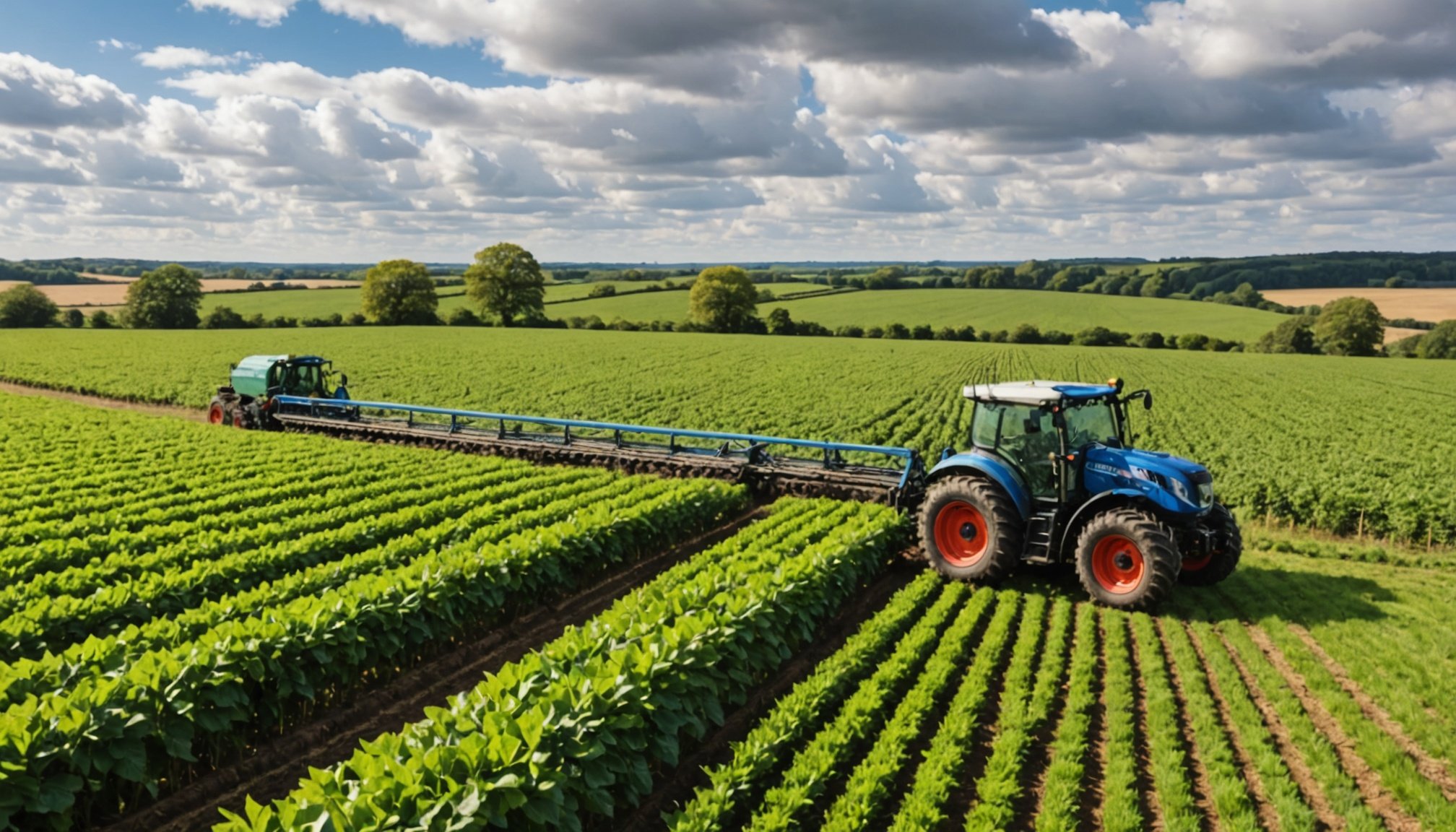Overview of Blockchain Technology in Agriculture
Blockchain technology is transforming sectors worldwide, and agriculture is no exception. At its core, blockchain is an immutable digital ledger that securely records transactions across multiple systems, fostering transparency and trust among users. This technology’s applicability in agriculture has vast potential, improving efficiency and providing solutions to longstanding issues.
In the UK, agricultural practices have continuously evolved, yet traditional challenges remain, especially for agricultural cooperatives. These cooperatives play a crucial role by bringing farmers together to share resources, better market products, and encourage community support. However, they often face hurdles such as complex supply chains, information asymmetry, and logistical inefficiencies.
Additional reading : Boosting UK Beauty Brands: Top Influencer Marketing Tactics for Unmatched Brand Visibility
Integrating blockchain in agriculture presents significant opportunities for resolving these challenges. By offering a transparent and tamper-proof system, it enhances data integrity and traceability, essential for reducing fraud and ensuring quality within the supply chain.
Key benefits include:
In the same genre : Weather-proofing e-commerce ops for winter challenges
- Improved technology integration, facilitating seamless communication and coordination among cooperative members.
- Data accuracy, which encourages informed decisions and strategies.
- Enhanced consumer trust, enabled by comprehensive blockchain-based traceability solutions.
In summary, leveraging blockchain technology in the UK’s agricultural sector can drastically improve operational efficiency and member collaboration within cooperatives.
Benefits of Blockchain for Agricultural Cooperatives
Blockchain technology offers a wealth of beneficial enhancements for agricultural cooperatives. One of the primary advantages is the enhancement of supply chain transparency and traceability. By employing blockchain, cooperatives can track and record every step of the supply chain process, ensuring that all parties have access to a transparent and immutable record of transactions and product journeys.
Moreover, this technology facilitates significant improvements in data sharing and collaboration. All members of a cooperative can access a uniform platform where they can securely exchange data. This common ground reduces miscommunications and enhances cooperative efficiency, ensuring everyone works towards the same goals with access to the same truthful information.
Additionally, blockchain helps in reducing costs and inefficiencies in transactions and operations. By automating and securing transactions via smart contracts, agricultural cooperatives can minimize the complexities associated with traditional paper-based systems. This reduces administrative costs and expedites the entire transaction process, ensuring resources are allocated effectively to boost overall operational efficiency.
Incorporating blockchain within agricultural cooperatives not only benefits individual members but also promotes industry-wide collaboration and innovation.
Case Studies of UK Agricultural Cooperatives Using Blockchain
Examining the practical applications of blockchain in the UK agricultural sector reveals inspiring results. UK cooperatives are leading the charge with innovative strategies to enhance efficiency and transparency.
Success Story 1: [Specific Cooperative Name]
This pioneering cooperative adopted blockchain to track the provenance of produce. Implementing this technology resulted in quicker transaction times and increased trust among stakeholders. One member remarked, “Blockchain has revolutionised our operations by ensuring transparency.”
Success Story 2: [Specific Cooperative Name]
Another cooperative utilised blockchain to refine their supply chain management. This approach streamlined processes, reducing transaction costs and errors. Members have noted that their productivity and accountability have significantly improved.
Success Story 3: [Specific Cooperative Name]
In this case, blockchain facilitated the digital transformation of record-keeping practices. Members now experience seamless data sharing, which has improved decision-making processes. A cooperative member shared, “Blockchain has truly enhanced our communication and operational efficiency.”
These case studies highlight the measurable impact of blockchain on the UK’s agricultural cooperatives. By embracing such innovative technologies, these cooperatives are setting a benchmark for others in the industry to follow.
Challenges in Implementing Blockchain in Agriculture
The implementation challenges of blockchain in agriculture are significant, involving a mix of technological, societal, and regulatory hurdles. Blockchain adoption faces technological barriers primarily due to accessibility and infrastructure limitations. Many agricultural regions lack reliable internet connectivity or the advanced technology required, which hampers adoption.
Another critical barrier is the resistance to change within established cooperative structures. Farmers and agricultural businesses have long-standing practices and systems, and the shift to blockchain requires not only a technical upgrade but also a change in mindset. This resistance is further compounded by the complexity of integrating blockchain with existing systems without disrupting workflows.
From a legal standpoint, the barriers include complex regulatory considerations regarding data management. Blockchain technology involves the recording and sharing of vast amounts of data, which raises issues about data privacy and ownership. Regulatory frameworks around the world are still evolving, leaving many in agriculture uncertain about compliance and legal implications.
To overcome these obstacles, a comprehensive approach combining technological upgrades, educational initiatives, and legal clarity is essential. Encouraging stakeholders to adopt blockchain involves not only demonstrating its potential benefits but also addressing these pervasive adoption challenges effectively.
Future Potential of Blockchain in UK Agriculture
As the agricultural sector looks to the future of blockchain, it anticipates numerous growth opportunities. Emerging technologies are steadily reshaping agriculture, and blockchain is at the forefront of this transformation. Its trends suggest that blockchain could revolutionise how agricultural data is shared and managed.
A significant trend analysis shows that emerging technologies, like blockchain, could lead to higher adoption rates, especially among cooperatives. Blockchain’s potential to create secure and transparent transaction systems is particularly appealing for these collaborative groups. Predictions indicate that it’s only a matter of time before blockchain adoption becomes commonplace, enhancing operational efficiency and fostering trust within the supply chain.
New business models are set to arise as blockchain becomes integrated into agriculture. For example, tracking produce from seed to sale using blockchain can create revenue streams by offering provenance data as a premium service. This level of transparency and reliability opens doors for innovative business propositions and partnerships.
Painting a broader picture, the future of blockchain in agriculture isn’t merely about technological advancements. It’s about reimagining how farms function and interact with markets, aiming to boost productivity, traceability, and sustainability, thus paving the way for a new era in agricultural innovation.
Testimonials from Farmers and Cooperatives
Blockchain technology is transforming agriculture by providing farmers with innovative solutions that facilitate efficiency and transparency. Farmers’ testimonials are overflowing with stories of success, painting a vivid picture of its real-world impact. For many, this technology is not just a digital ledger but a bridge to more connected and informed agricultural practices.
Imagine a farmer from a small cooperative sharing how blockchain improved their decision-making processes. The ability to access real-time data has led to measurable gains in productivity. With transparent supply chains, farmers now have the power to assure consumers of the quality and origin of their produce, fostering trust and enhancing market reputation.
One farmer noted: “Blockchain has enabled us to understand our operations better and reduce waste. Our productivity soared since adopting this technology.” Such farmer perspectives reveal a common thread of enhanced tracking capabilities and business insight, promoting future-ready practices.
There is increasing excitement over potential expansions. The collaborative aspect of blockchain allows for seamless collaboration across global markets, harnessing collective knowledge and resources. The agricultural community envisions a future where blockchain drives sustained growth and collaboration, anchoring ethical and effective practices.











